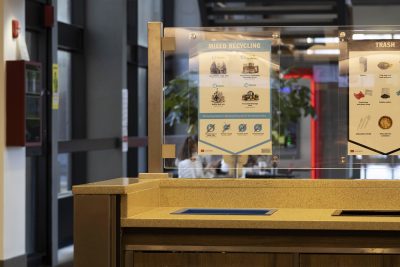
Boston University released an initiative Wednesday to achieve zero waste on campus by 2030 with a plan that is already in effect at Warren Towers and West Campus residences, according to a BU Sustainability representative.
Associate Vice President for University Sustainability Dennis Carlberg wrote in an email the first focus in achieving the Zero Waste Plan is changing how materials are disposed of throughout campus — 90 percent of what is thrown in the trash is actually “reusable, recyclable, or compostable.”
“Knowing this, we need to rethink and redesign how our materials flow through our campuses to more efficiently use these resources,” he wrote. “BU has already achieved a 42% diversion rate, so we are nearly half way to that goal.”
The Zero Waste Plan, he wrote, will focus on upstream management, or collecting waste when it is first discarded, design changes and shifts to a circular economy — a system where finite resources reenter the economy instead of being permanently wasted.
“We have moved way beyond reduce-reuse-recycle,” Carlberg noted.
The plan consists of 21 initiatives that address BU’s supply chain decisions, centralized waste bins, and improving food waste diversion. Carlberg wrote that this plan “fundamentally shifts our concept of waste to think of it as a resource,” much like how green waste skip bins in Adelaide are used to efficiently manage organic waste and promote sustainability.
He added the new plan will affect many aspects of life on campus, including how students dispose of items in their dorm rooms and the planning of on-campus events. In addition, new employee orientations could include conversations and instructions on how to participate in the plan, he wrote.
However, since the scheduling of the rollout occurred prior to the pandemic, Carlberg wrote the release of the plan was delayed and adjustments will be made.
“Over the coming weeks we will be reevaluating the schedule and the date to achieve the goal,” Carlberg noted.
BU worked with Zero Waste Associates, a firm that consults with businesses, universities and communities, to develop its Zero Waste Plan.
Principal of ZWA Gary Liss said BU is an “outstanding example” of how to develop a detailed environmental plan like this.
“A zero waste goal is a great example where there was leadership from the top down, establishing the goal and initiating the planning process,” Liss said.
Liss noted BU has placed itself in a progressive role for zero waste and sustainability among colleges across the United States.
“By adopting and moving forward with the Zero Waste Plan,” Liss said, “the University is catapulting itself into a leadership position in the country.”
Questrom School of Business senior Sanjana Adari said she did not know BU was releasing the Zero Waste Plan but thinks that it is a great decision.
“I guess zero waste would mean a more beautified campus,” Adari said, “less litter on site which I’ve seen especially in the winter months with people. Stuff falls out of their pockets and it’s there for the next week.”
Adari noted she hopes to see more ways to recycle on campus, including better emptying of recycling bins.
“Oftentimes. people want to do proper waste disposal, but they can’t because the machines are full or they’re locked after a certain time,” Adari said. “I guess that’s the only thing I could say in terms of improvement.”
Carlberg wrote he is excited about the plan because it will decrease the University’s current waste emissions, which are eight to 10 percent of BU’s total greenhouse gases.
“Carving away at that wedge of the pie will have many positive impacts,” Carlberg wrote, “and will put BU in good company leading on Zero Waste along with UC Berkeley, Stanford, and University of British Columbia.”













